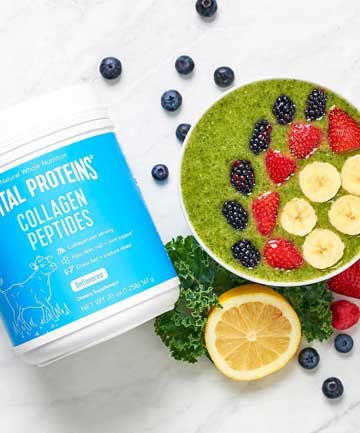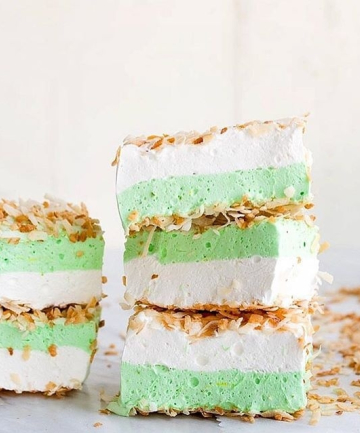It wasn't long ago that collagen was something we only thought of when shopping for anti-aging treatments. Today, Instagram is flooded with #collagenpowder which has found its way into everything from cookies to smoothies. Is collagen something we should actually be ingesting? Turns out, yes! And it's not as unappetizing as it sounds.
What exactly is collagen?
Collagen is the body's most abundant form of protein and one of the most vital proteins your body needs to function (hence the popular Vital Proteins brand that dominates the collagen powder space). "Collagen is the glue that holds your body together," says Janine Whiteson, RD. "It's found in the bones and connective tissue and it helps give structure to our hair, skin, nails, bones, ligaments and tendons. We're able to move around, bend and stretch because of collagen and it helps keep our hair shiny, our nails strong and our skin supple and glowing." Unfortunately, collagen not only starts to decline with age, but also with exposure to environmental aggressors like UV rays, which explains why skin tends to be less firm and radiant as we age.
Image via @vitalproteins
What exactly is collagen?
Collagen is the body's most abundant form of protein and one of the most vital proteins your body needs to function (hence the popular Vital Proteins brand that dominates the collagen powder space). "Collagen is the glue that holds your body together," says Janine Whiteson, RD. "It's found in the bones and connective tissue and it helps give structure to our hair, skin, nails, bones, ligaments and tendons. We're able to move around, bend and stretch because of collagen and it helps keep our hair shiny, our nails strong and our skin supple and glowing." Unfortunately, collagen not only starts to decline with age, but also with exposure to environmental aggressors like UV rays, which explains why skin tends to be less firm and radiant as we age.
Image via @vitalproteins
Jenn Randazzo, MS, RD, CLT notes that consuming collagen and its unique amino acid profile contributes to our bodies' own collagen production, which may ultimately boost collagen levels and help our connective tissues stay as healthy as possible. "It's also important to highlight that while the benefits of collagen are often associated with beauty, there is a growing body of research that's suggesting it can support much more," she says. "Regular collagen consumption has been shown to improve digestion, support our bones and joints and even contribute to weight management. While more research needs to be done, there is a lot of excitement around this field of study right now."
But there are so many forms of collagen protein, which one to choose?
No matter where you get your collagen from (chicken, beef, fish or eggshell membranes — yes, that last one is a thing), collagen is collagen and you're getting the same amino acid profile, which is why Randazzo says that the best type of collagen for people to consume should be one that they can easily incorporate into their lifestyle and consistently use and that aligns with their personal dietary preferences and values (paleo, grass-fed, pasture-raised, etc.).
Whiteson adds that like with all supplements, it's important to read labels. "Some supplements can contain a lot of unnecessary additives and fillers so make sure you're getting an organic, ethically produced, wholesome, clean option that contains the highest level of protein content." When it comes to taste, note that a good collagen protein powder should be tasteless (lest you think you're in for a beef-flavored strawberry smoothie) and should fully dissolve and blend well with what you are mixing it into.
Image via @vitalproteins
No matter where you get your collagen from (chicken, beef, fish or eggshell membranes — yes, that last one is a thing), collagen is collagen and you're getting the same amino acid profile, which is why Randazzo says that the best type of collagen for people to consume should be one that they can easily incorporate into their lifestyle and consistently use and that aligns with their personal dietary preferences and values (paleo, grass-fed, pasture-raised, etc.).
Whiteson adds that like with all supplements, it's important to read labels. "Some supplements can contain a lot of unnecessary additives and fillers so make sure you're getting an organic, ethically produced, wholesome, clean option that contains the highest level of protein content." When it comes to taste, note that a good collagen protein powder should be tasteless (lest you think you're in for a beef-flavored strawberry smoothie) and should fully dissolve and blend well with what you are mixing it into.
Image via @vitalproteins
While collagen is a great addition to most people's diet, depending on your goals it shouldn't replace your usual protein powder. "If you're looking to add/gain muscle after a workout, a complete protein powder is what you're looking for," says Whiteson. "If you're looking for a supplement that's going to help you better recover, help your joints to hurt less, help to increase your flexibility, collagen protein powder is definitely the way to go."
This brings up an important point: collagen protein is not a complete protein. To be a complete protein, you need to contain all essential amino acids (amino acids are the building blocks of protein and the essential ones are the ones we must get from our diet — versus the ones our body can make on its own). The takeaway here is that while collagen is a great protein source, it should not be considered your main protein source.
How can I work collagen protein into my diet?
Because it's a powder and tasteless, collagen protein is very versatile. You can mix it into coffee, smoothies, pancake or cookie batter, etc. As for results, you'll want to have a serving consistently every day for at least two weeks to start seeing a change, according to Randazzo (Whiteson cautions that it can take a few months). And, while both Randazzo and Whiteson underline that collagen is a safe addition to most people's diets, always speak with a doctor before starting a new supplement, especially if you're pregnant, lactating or breastfeeding.
Image via @vitalproteins
This brings up an important point: collagen protein is not a complete protein. To be a complete protein, you need to contain all essential amino acids (amino acids are the building blocks of protein and the essential ones are the ones we must get from our diet — versus the ones our body can make on its own). The takeaway here is that while collagen is a great protein source, it should not be considered your main protein source.
How can I work collagen protein into my diet?
Because it's a powder and tasteless, collagen protein is very versatile. You can mix it into coffee, smoothies, pancake or cookie batter, etc. As for results, you'll want to have a serving consistently every day for at least two weeks to start seeing a change, according to Randazzo (Whiteson cautions that it can take a few months). And, while both Randazzo and Whiteson underline that collagen is a safe addition to most people's diets, always speak with a doctor before starting a new supplement, especially if you're pregnant, lactating or breastfeeding.
Image via @vitalproteins






